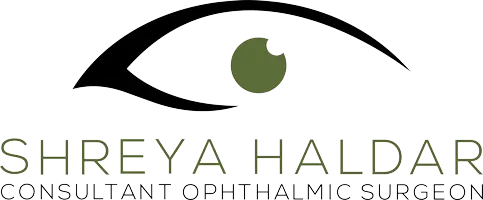YAG Laser Capsulotomy
Harley Street, London
Posterior capsule opacification (PCO), often called a secondary cataract, is a common cause of vision decline after successful cataract surgery. Fortunately, this condition is easily treated by a simple, non-invasive procedure called YAG laser capsulotomy, offered conveniently by Miss Shreya Haldar on Harley Street in London. This treatment effectively restores sharp vision, providing a quick, safe, and painless solution without the need for additional surgery.
Understanding Posterior Capsule Opacification (PCO)
Following cataract surgery, the clear natural lens is removed and replaced by an artificial intraocular lens (IOL). The thin membrane that holds this artificial lens, called the posterior capsule, remains inside the eye to support the IOL. Over months or years, microscopic lens epithelial cells left behind may proliferate and cause clouding of this capsule.
This clouding scatters incoming light and blurs vision, reproducing many of the symptoms patients originally experienced with their cataract. Although PCO is not dangerous, it can significantly impact visual quality, causing blurred or hazy sight, especially in bright light or when reading.
Causes and Risk Factors
PCO develops due to natural cell growth after cataract surgery. Risk factors include younger age at the time of surgery (as healing tends to be more vigorous), certain types of intraocular lenses, and individual variations in healing and inflammatory response.
While PCO is almost inevitable over long periods for many patients, its progression varies widely. Most cases develop gradually, but some may advance more rapidly depending on these factors.
Recognising Symptoms of PCO
Patients experiencing PCO often notice a gradual decline in their vision, described as blurring or haziness like looking through a fogged window. This fading clarity can make reading fine print challenging and reduce the ability to distinguish colours, which may appear dull or faded. Additionally, many report glare and halo effects around lights, especially during night-time driving, along with diminished contrast sensitivity that disrupts everyday tasks. If you find your vision worsening months or years after cataract surgery and this cannot be fully corrected with glasses, PCO may be the underlying cause.
Diagnosis and Assessment
Diagnosing PCO is straightforward for Miss Haldar using a slit-lamp biomicroscope, which provides a magnified view of the posterior capsule. Detailed examination confirms the presence, location, and extent of the clouding. This assessment helps determine the suitability for YAG laser capsulotomy.
The YAG Laser Capsulotomy Procedure
The capsulotomy is performed in clinic as an outpatient procedure. After administering numbing eye drops, Miss Haldar uses a specialised YAG laser to gently create a tiny opening in the cloudy capsule behind the artificial lens.
Patients are seated comfortably at a laser machine like that used for routine eye examinations. The procedure takes only minutes and is generally painless, though some may perceive brief sensations such as mild flicking or flashes of light.
There are no incisions or any need for surgical sutures. The opening allows light to pass through unimpeded, rapidly restoring clear vision.
Immediate and Longer-Term Outcomes
Most patients notice significant improvement in clarity within hours following the YAG laser capsulotomy, often describing the experience as remarkably swift and effective. While some achieve near-immediate vision restoration, for others, visual acuity continues to improve progressively over the following days and weeks as the eye settles and healing completes. The procedure itself is highly safe, with success rates exceeding 95%, making it the preferred treatment option for posterior capsule opacification (PCO).
Occasionally, the opening created by the laser may become partially blocked by inflammatory cells or debris. In such rare cases, an additional laser session can be performed to restore the opening’s patency and maintain clear vision. Overall, patients appreciate the minimal downtime associated with this outpatient procedure, often resuming normal activities, including reading and screen use, almost immediately, with just a brief recommendation to avoid driving until vision stabilises after the treatment day.
Potential Risks and Complications
While YAG laser capsulotomy is considered one of the safest and most routine laser procedures, it still carries small but important risks, which are carefully managed by Miss Haldar’s expert care.
One of the most common concerns is a temporary rise in intraocular pressure shortly after the treatment. This pressure spike, although usually transient and reversible with medication, necessitates monitoring to prevent any harm to the optic nerve. Patients are advised to attend follow-up appointments promptly to ensure that intraocular pressure remains within safe limits.
Mild inflammation is another potential side effect, typically well-controlled by anti-inflammatory eye drops prescribed after the procedure. Symptoms are usually negligible and resolve quickly without lasting effects.
Rarely, more severe complications such as retinal detachment or cystoid macular oedema may occur. These risks are very uncommon but require immediate attention to protect vision. With thorough pre-treatment assessment and vigilant post-procedure follow-up, Miss Haldar minimises these risks, ensuring the highest standards of patient safety and successful visual outcomes.
Why Choose Miss Shreya Haldar for Your YAG Laser Capsulotomy?
Miss Haldar’s precision and expert technique in YAG laser capsulotomy yield consistently excellent results with minimal discomfort. Her Harley Street clinic offers patients the comfort of a welcoming, state-of-the-art environment with rapid access to this advanced treatment.
She ensures patients are fully informed about the procedure, expected outcomes, and any precautions necessary before and after treatment. With personalised care and attentive follow-up, Miss Haldar supports patients through every stage of their vision restoration journey.
Don’t let a secondary cataract dim your world. If you’re experiencing blurred vision after cataract surgery, arrange a consultation with Miss Shreya Haldar today. This simple, fast, and effective laser procedure may be the key to bringing clarity and colour back to your life – effortlessly and safely.
Contact us now to book your appointment at our Harley Street clinic and experience the highest standard of care for your eyes.
